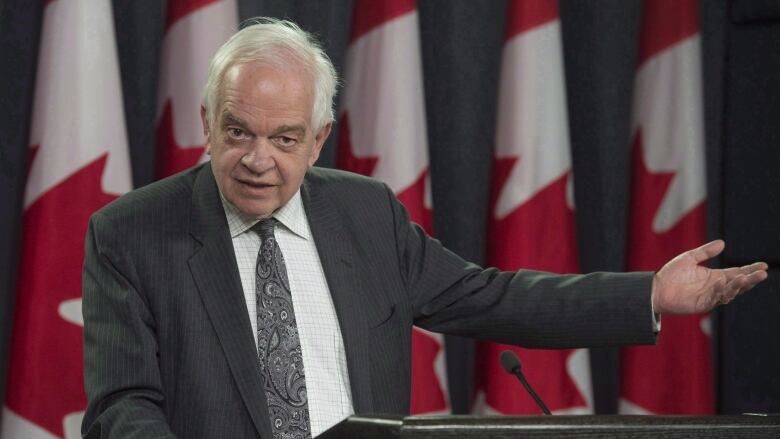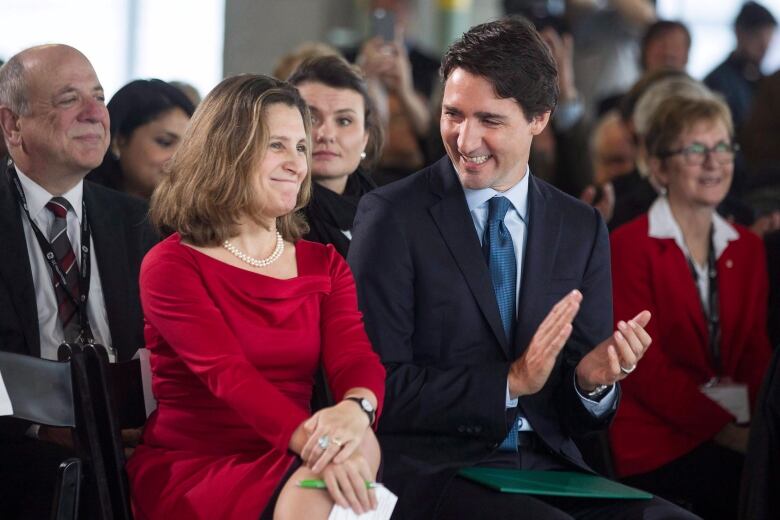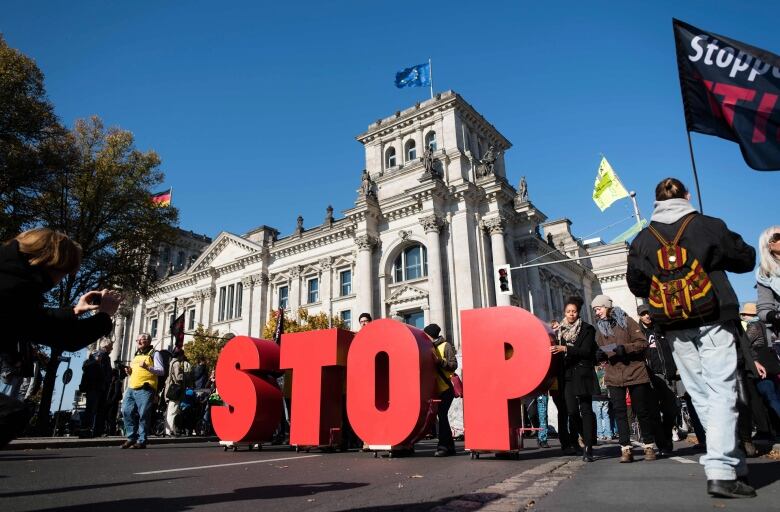EU visa standoff strains allies Canada needs to pass trade deal
If Canada won't lift visa requirement for Romanians, Bulgarians by April 12, EU obligated to reciprocate

Could Canadians soon require a visa to travel to the European Union?
It may sound ridiculous, but unless Canada's visa requirements are dropped for Romanians and Bulgarians by April 12, the European Union is required to reciprocate with visa requirements of its own.
Even ifbrinkmanship subsides andavisa war is averted, the hard feelings come at a bad time for Canada, as it triesto rally votes neededto ratifyits trade deal later this year.
Next Tuesday in Strasbourg, France, the EU'sCollege of Commissioners roughly equivalent to its executive, or cabinet, representing all 28 member states is expected to proceed with a "delegated act," imposinga visa requirement forCanadians and Americans visiting Europe.
The Europeans believethey are obligated to reciprocate when unwarranted visas are imposed on citizens ofmember countries.The EU set April 12 as the deadline for all countries to comply with avisa reciprocity mechanism adopted in 2014.
That means Canada needsto lift its visa requirement for Romanian and Bulgarian citizens by Tuesday.
The U.S. currentlyrequires visas for citizens from five EU member statesand is part of the same dispute.
The issuehas draggedon for years, originating withfears that as some central and eastern European countries with vulnerable migrant populations, such as the Roma, joined the EU, too many could overstayvisits in North America or claimasylum.
Canada 'patronizing'
An earlier dispute between Canada and the Czech Republic was resolved in 2013. But forRomanians and Bulgarians, visa requirements remain in place.
"Canada's visa policy is not based on reciprocity. Rather, Canada must be satisfied that countries meet its criteria for a visa exemption," Immigration department spokesman Felix Corriveau wrote in an email to CBC News.
The previous Conservative government led by Stephen Harper spoke of wanting to resolve the issue soon. Once implemented,Canada's new electronic travel authorization will makeit easier for Romanians who have held a valid Canadian visa in the last 10 years to travel to Canada again, for example.
When negotiations wrapped for the Canada-EU trade agreement two years ago, a solution seemed imminent.
But a meeting Wednesday between Canadian and European officials found the two sides still disagreeing.
"The outcome was disappointing," Sorin Moisa, a Romanian member of the European Parliament told CBC News, describing the behaviour of theCanadian side as unacceptable, undignified and patronizing.

Rather than bridging gaps, Moisa said Canada was "super-evasive, aggressive and arrogant," adding to the criteria required for lifting its visa in unfair ways that aren't transparent and can't bechallengedin court.
He accused Canada of trying to do "social-political engineering," demanding things of Romania it does not require from other countries, applyingcriteria that "would not hold water."
"This has to stop," he told CBC.
Failing to back its fellow stateson the visa issue would be a "huge continental embarrassment" and a failure of EUsolidarity, Moisasaid.
Travel unaffected for now
Canadian spokesmanCorriveausays officials remain "heavily engaged in a very positive, ongoing dialogue," and arecommitted to extending visa-free travel as soon as possible.
Canadian travellers don't have anything to fear as far as their spring or summer travel plans are concerned.Even if nothing is resolved by the deadline, nothing would takeeffect immediately.
Over the nextsix months, the EU commissioncouldbe overruled by majority votes at either the European Council (representing foreign ministers from 28 member states) or the elected members of the European Parliament in Brussels.
If such a vote to object does not pass, new ruleswould take effect insidea 90-day window after that, pushing any new visa requirementsto late 2016 or early 2017.
The European Council in particular is unlikely to allow the visa retaliation to disrupt both personaland business travel between North America and Europe. The implications for tourism and trade would be significant.
That doesn't mean there isn't a cost to Canada of letting the dispute drag on.

CETA ratification uncertain
Thebrinkmanship over visa rules comes asCanada needs allies, not enemies with a ratification vote looming on the Comprehensive Economic Trade Agreement (CETA) later this year or early in 2017.
CETA may need to be ratified also inthe individual legislaturesof EU member states.
Far from assured, Canada's trade deal has been caught up in European protests opposingongoing trade talks with the U.S.
Earlier this year, Canada compromised on CETA'scontentious investor-state dispute settlement mechanism, in an effort to overcome European opponents of the deal.
- EU quietly asks Canada to rework trade deal's thorny investment clause
- Canada moves a step closer to ratifying 'gold-plated' trade deal with EU
Moisa, a member of the Socialists & Democrats (S&D)in Brussels, has been a key voice speaking out in favour of CETA as his party's rapporteur.
S&D is a large voting bloc in the Brussels parliament, with MEPs from all member states. It'sa crucial swing vote forratifying CETA.
Moisa was in Ottawa last month with a trade delegation. Hemet with Immigration Minister JohnMcCallumand had beenoptimistic resolution was possible.
Very constructive conversation with Minister @HonJohnMcCallum on visas and other issues of EU-Canada and Canada-Romania mutual interest.
—@sorinmoisaHe saidhe'stried not to link the trade deal to the visa issue, but others have. He's increasingly frustrated and feels he may be forced to resign as CETA rapporteur.
"I cannot show up in Romania again," he said, if it's not dealt with.
Just as Canada is using its sovereign rights to continue to impose visas, he said Romanian MEPs and other sympathetic parliamentarianscan choose to use their sovereign powerto notratify CETA.
Canada's behaviour is toxic, he said. And S&D is "known for its spirit of solidarity."












_(720p).jpg)


 OFFICIAL HD MUSIC VIDEO.jpg)
.jpg)



























































































